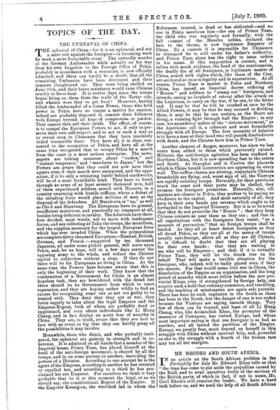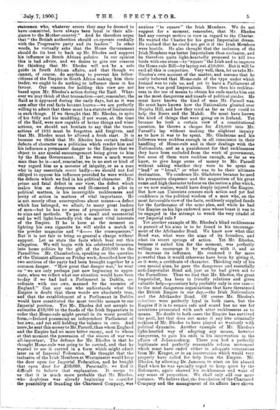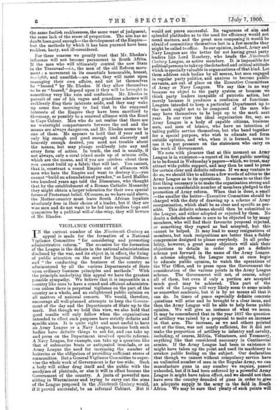MR. RHODES AND SOUTH AFRICA.
TN an article on the South African problem in the Fortnightly for July Mr. Edward Dicey tells us that " the time has come to put aside the prejudices caused by the Raid, and to avail ourselves freely of the services of the British party, of which in fact, if not in name, Mr. Cecil Rhodes still remains the leader.. We have a hard task before us, and we need the help of all South African statesmen who, whatever errors they may be deemed to have committed, have always been loyal in their alle- giance to the Mother-country." And he therefore urges that " the British authorities should co-operate cordially with-the Progressive party and its leaders." In other words, he virtually asks that the Home Government should do its best to back up Mr. Rhodes and support his influence in South African politics. In our opinion this is bad advice, and we desire to give our reasons for thinking that Mr. Rhodes will not be a safe guide in South African affairs, and that though we cannot, of course, do anything to prevent his fellow- citizens' of the Empire in South Africa making him their leader, we ought to do nothing to influence them in his favour. Our reasons for holding this view are not based upon Mr. Rhodes's action during the Raid. What- ever we may think of that transaction—not, remember, the Raid as it appeared during the early days, but as it was seen after the real facts became known—we are perfectly willing to admit that there must be a statute of limitations in such things. If we thought that Mr. Rhodes, in spite of his folly and his muddling, if not worse, at the time of the Raid, were now capable of better things and wiser actions, we should not hesitate to say that the trans- actions of 1895 must be forgotten and forgiven, and that -Mr. Rhodes must be allowed a fresh start. It is because we think that Mr. Rhodes has certain radical defects of character as a politician which render him and his influence a permanent danger to the Empire that we ' object to any special encouragement being given to him by the Home Government. If he were a 'much worse man than he is—and, remember, we in no sort or kind of way regard him as a monster of iniquity, or as a man who in any essentials means badly—we should not feel obliged to oppose' his influence provided he were without the defects which we find in his political character. His prime and fatal defect in our view, the defect which makes him so dangerous and ill-omened a pilot in political matters, is his incorrigible recklessness and levity of action in matters of vital importance. 'He is not merely often unscrupulous about means—a defect which has belonged, we admit,- to many great leaders of men—but he has no sense of proportion in regard to aims and methods. To gain a small and unessential end he will light-heartedly risk the most vital interests of the Empire. If he is keen at the moment on lighting his own cigarette he will strike a match in the powder magazine and "d the consequences." But' it is not fair to bring so general a charge without support. Let us state the facts which bear out this allegation. We will begin with his celebrated incursion into home politics by the gift of the £10,000 to the Parnellites. Mr. Chamberlain. speaking on the question of the Unionist alliance on Friday week, described how the two sections of the party had been brought together by a common danger. "How great that danger was," be went on "we are only perhaps just now beginning to appre- ciate, when we reflect what our situation would have been to-day if we had had a Parliament in Dublin, co- ordinate with our own, manned by the enemies of England." Can any one who understands what the Empire is doubt that these words are absolutely true, and that the establishment of a Parliament in Dublin would have constituted the most terrible menace to our Imperial position. Yet Mr. Rhodes did not scruple to subscribe £10,000 to the funds of the Irish Separatists in order that Home-rule might prevail in its worst possible form,—Ireland possessing an independent Parliament of her.own, and yet still holding the balance in ours. And more,he sent this money to Mr. Parnell, than whom England and the Empire had no more bitter enemy, and to whom at that moment the possession of the sinews of war was all-important. • The defence for Mr. Rhodes is that he thought Home-rule was going to be carried, and that he wanted to see it carried in a form which might admit later on -of Imperial Federation. He thought that the inclusion of the Irish Members at Westminster would keep the door open • for Imperial Federation, and he bought that open door for £10,000. Personally. we find it difficult to believe that explanation. It seems to .us• that it is much more probable that Mr. Rhodes. 'who doubtless was already beginning to consider. the possibility of founding the Chartered Company, was anxious " to square" the Irish Member?. We do not suggest for a moment, remember, that Mr. Rhodes had any corrupt motive in view in regard to the Charter. He wanted the Charter for his great Imperialist dream. He realised that he could not get it if the Irish Members were hostile. He also thought that the inclusion of the Irish Members was better Imperialism than exclusion, and he therefore quite light-heartedly proposed to kill two birds with one stone—to "square" the Irish and to improve the Home-rule Bill—by laying out £10,000. But it will be said all this is conjecture. Very well, then, let us take Mr. Rhodes's own account of the matter, and assume that he really believed that Home-rule of the type under which Ireland was to rule us, and yet to have a Parliament of her own, was good' Imperialism. Even then his reckless- ness in the use of means to obtain his ends marks him out as the most dangerous and unsafe of political guides. He must have known the kind of man Mr. Parnell was. He must have known how the Nationalists gloated over Majuba Hill, and how they tried as far as they could to help the Boers and the Mandi. He must have known the kind of things that were going on in Ireland. .Yet because he took a certain view of a constitutional question, he throws a. cheque for £10,000 into Mr. Parnell's lap without making the slightest inquiry as to how .it was to be spent. Mr. Gladstone and his followers were reckless enough in all conscience in their handling of Home-rule and in -their dealings with the Nationalists, and as a punishment for that recklessness they have been excluded from the work of government, but none of them were reckless enough, as far as we knotv, to give huge sums of money to Mr. Parnell without asking whether they were to be spent on "lead" or " bread," or what was to be their ultimate destination. We condemn Mr. Gladstone because he used his persuasive eloquence and the magnetism of his great name and high character toforce on the nation a plan which, as we now realise, would have deeply injured the Empire. But how can Unionists censure such action and yet feel confidence in the political wisdom of a man who, on the most favourable view of the facts, recklessly supplied funds for the furtherance of the same plan, and while he had the Empire on his lips endowed men whose boast it was to be engaged in the attempt to wreck the very citadel of our Imperial rule ?
Yet another example of Mr. Rhodes's blind recklessness in pursuit of his aims is to be found in his encourage- ment of the Afrikander Bond. We know now what that Bond was, what were the aims of its founders, and .what its secret springs of action. Yet Mr. Rhodes, because it suited him for the moment, was perfectly willing to encourage it by working tvith it, and so to increase its influence. He rendered it far more powerful than it would otherwise have been by giving it, as it were, a certificate of character. Thinking only of his own special aims, he gave the dangerous and essentially. anti-Imperialist Band aid, just as he had given aid to the Parnellites. Thus we find that Mr. Rhodes, the great Imperialist, has been in friendly relations and given valuable help—pecuniary help probably only in one case— to the most dangerous organisations that have threatened the British Empire in our day,—the Irish Nationalists and the Afrikander Bond. Of course Mr. Rhodes's intentions were' perfectly loyal in both cases, but the Empire if it is to remain safe and sound has no use for intentions prosecuted with such utter recklessness as to means. No doubt in both cases the Empire has survived the peril, but that does not make it any lass criminally reckless of Mr. Rhodes to have played so wantonly with political dynamite. Another example of Mr. Rhodes's light-hearted way of adopting any means, however dangerous, to gain his ends is his intervention in the affairs of Johannesburg.. There you had a perfectly legitimate and perfectly reasonable reform movement which must have ended either in adequate concessions from Mr. Kruger, or in an insurrection which would very properly have called for help from the Empire. Mr. Rhodes, by allowing Dr. Jameson to start on his absurd Raid when he was specially urged to keep quiet by the Reformers, again showed his recklessness and want of any sense of proportion. We shall only add one more instance. We believe that the foundation of the Chartered Company and the management of its affairs have shown the same fooliph recklessness, the same want of judgment, the same lack of the sense of proportion. The aim has no doubt been good enough—the development of the Empire— but the methods by which it has been pursued have been reckless, hasty, and ill-considered.
For these reasons we greatly trust that Mr. Rhodes's influence will not become paramount in South Africa. If the men who will ultimately control the new State in the Transvaal—i.e., the men of the old Reform move- ment : a movement in its essentials honourable, honest, hoci-fide, and unselfish—are wise, they will insist upon managing their own affairs, and not let themselves be " bossed " by Mr. Rhodes. If they allow themselves to be so " bossed," depend upon it they will be brought to something very like ruin and confusion. Mr. Rhodes in pursuit of one of his vague and grandiose schemes will recklessly fling their interests aside, and they may wake up some fine morning to find that in the supposed interests of the Empire they have been sacrificed to Germany, or possibly to a renewed alliance with the Bond in Cape Colony. Men who do not realise that there are no watertight compartments between the end and the means are always dangerous, and Mr. Rhodes seems to be one of these. He appears to hold that if your end is only big enough and good enough and sincerely and honestly enough desired, you need not trouble about the means, but may plunge recklessly into any and every form of action. In truth, the end is usually, if not always, only a coral island made up of minute cells, which are the means, and if you are careless about them you cannot build up a fabric that will last. You cannot, that is, construct a sound Empire out of alliances with men who hate the Empire and want to destroy it; you cannot "build on a foundationof paradox," as Lord Halifax two hundred years ago told the Dissenters, who thought that by the establishment of a Roman Catholic Monarchy they might obtain a larger toleration for their own special forms of Protestant belief. Of course, as we have said above, the Mother-country must leave South African loyalists absolutely free in their choice of a leader, but if they are wise men and do not want to be led into endless Logs and quagmires by a political will-o'.the-wisp, they will beware of Mr. Rhodes.












































 Previous page
Previous page